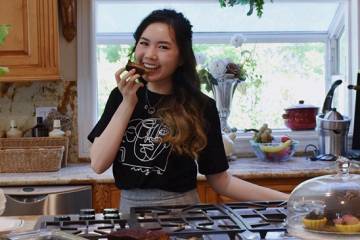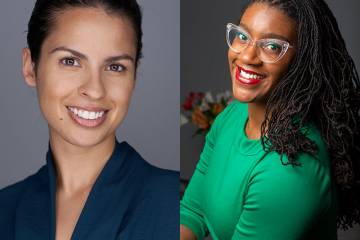Last year, the Johns Hopkins Life Design Lab launched new grants programs and a summer career seminar in order to support students whose internships and career opportunities were canceled in the wake of the COVID-19 pandemic. This summer, the lab is expanding both programs into long-term initiatives, allowing students to take control of their own career journeys.
As executive director of the Life Design Lab, Matthew Golden is in charge of a dedicated team of life design educators and staff focused on guiding students to the opportunities, experiences, and networks available at Johns Hopkins to help them fulfill their career and life goals. He said the Summer Grant Programs and Life Design Summer Institute are designed to give students the flexibility to build their own nontraditional internships and opportunities as part of their educational experiences.
"It took an incredible effort by our entire team to design, promote, and implement the Design Your Summer Experience Grants and Life Design Summer Institute," Golden said. "Our staff jumped into action when COVID-19 disrupted the summer plans of so many of our students, and that quick shift from a reactive approach to proactive directly impacted over 300 summer experiences."
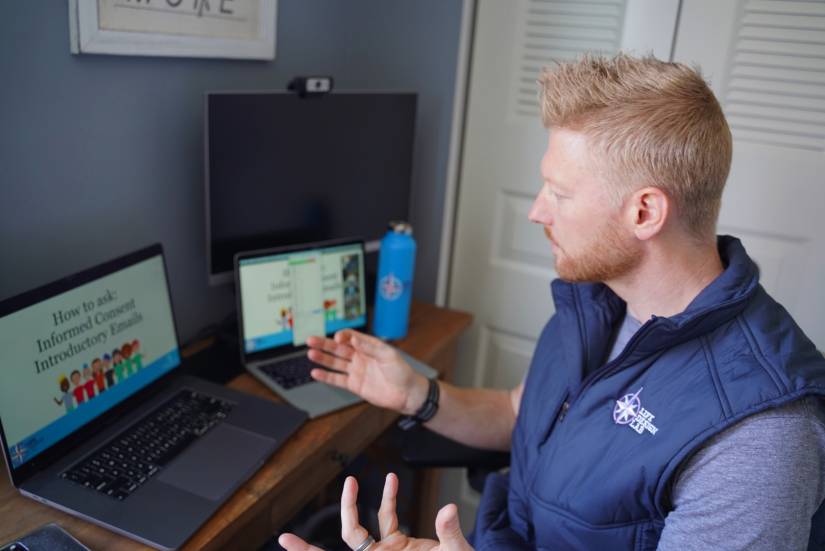
Image caption: Matthew Golden facilitates one of the 2020 Life Design Summer Institute Sections, a fully virtual experience launched to provide a valuable summer experience for over 100 Hopkins undergraduates whose summer plans were disrupted due to COVID-19.
Image credit: Courtesy of Matthew Golden
Golden continued, "The takeaway of those experiences last summer is there are more than enough of our students who have an innovative and entrepreneurial spirit and who have the capacity to design a meaningful experience that ties together interests from different aspects of their identity. We wanted to continue that by validating our student's interests and experiences by building on these programs for this summer."
The Summer Grant Program includes seven separate grants and funding sources, including the Design Your Summer Experience Grants, funded by the generous support of university trustee and alum Chuck Clarvit; SOAR Summer Plunge Grants for first-generation, limited income students, funded by Bloomberg Philanthropies; remote work supplies funding; and a Steinberg Family Grant for students who have secured unpaid summer internships; and grants funded by the Center for Student Success and the Second Decade Society.?
A single application form, accessed on Handshake, streamlines the application process for all seven grants. To apply, students must provide a completed application form, a resume, and a statement of grant purpose including a proposed budget and requested funding. The Life Design Lab team then determines which of the grants works for the student proposals and distributes funds accordingly.
Farouk Dey, vice provost for integrative learning and life design, has articulated a vision for every student at Johns Hopkins University to participate in transformative immersive experiences such as internships, research opportunities, and study abroad programs, regardless of background or social capital. "As believers in the power of experiential learning, we know that many talented students are prevented by their own circumstances from experimenting with innovative ideas. With the help of our generous alumni and dedicated educators, our students, especially those most vulnerable to current economic conditions, are able to take some risks and make their dreams a reality," Dey said.
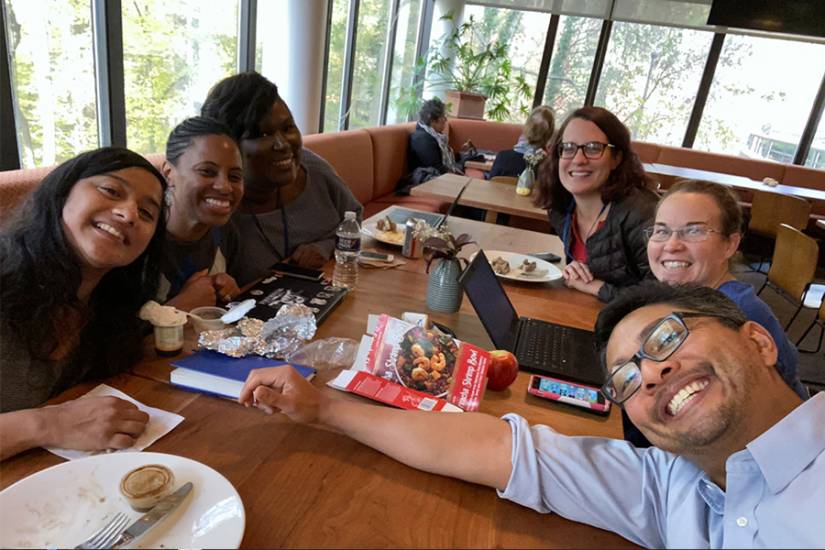
Image caption: Life Design Summer Institute staff meet for a planning session at a restaurant (pre-COVID-19)
Image credit: Courtesy of Matthew Golden
More than 150 students took advantage of the Design Your Summer Experience Grant in its pilot program last year. Open to all undergraduates, the DYSE grants provide up to $1,000 for student-designed summer projects or programs. These projects can include a variety of traditional and nontraditional opportunities, including both scholarly and professional pursuits.
Many used the grant to support the fight against COVID-19, funding hospital volunteerism and contact tracing jobs for several students.
Christin Lê is one of the students who took advantage of the Design Your Summer Experience fund last year. Through the grant, she opened Lê Crumb Bakery, a delivery bakery service that donated a percentage of its funds to Doctors Without Borders. Lê said the grant allowed her to purchase a KitchenAid stand mixer, which increased her output exponentially.
"I was afraid that my bakery didn't fit the requirements; this wasn't a traditional internship opportunity," Lê said. "I didn't think I would get it until I received the acceptance email the following week!"
In addition to the grant opportunities, the Life Design Lab will offer seven sections of focused life design curriculum this summer as part of the Life Design Summer Institute. The noncredit summer course introduces students to the concepts of life design—a vision of career planning that unites an individual's professional and personal passions, as well as opportunities for exploring new interests, to create a path that is fulfilling, rewarding, and self-motivating—and pairs participants with alumni mentors.
Julie Ho, a creative producer in marketing who graduated from the Krieger School of Arts and Sciences in 2005, served as one of the mentors for last year's Summer Institute. During the program, she said, they discussed ways to develop skill sets that reflect a student's interests and passions rather than building toward a specific career choice.
"In this day and age, the jobs you end up working in aren't necessarily in existence when you graduate. There's just so much that's new and so much change," Ho said. "So, it's more important for you to understand what your skills are, what you like, what you don't like, and build opportunities based off of that."
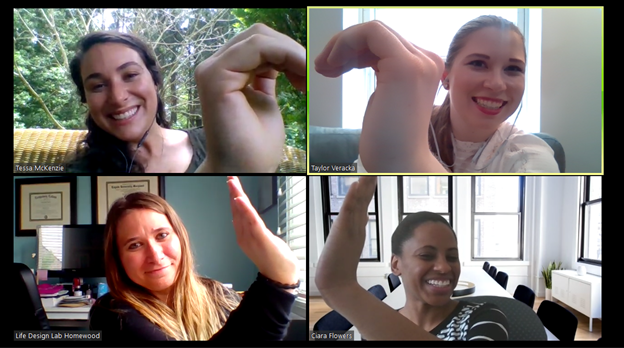
Image caption: Members of the Life Design Lab brainstorm ideas for student programs
Image credit: Courtesy of the Life Design Lab
This vision of making career decisions from passion and skill rather than specific goals is foundational to the Life Design Lab—and to Golden himself. Prior to coming to Hopkins, Golden split his time between higher education and professional sports, with time spent working in marketing and communications for both George Washington University and the NFL Players Association. This combination of skills, he says, prepared him for work in the Life Design Lab.
"My work in higher ed, paired with years helping former athletes navigate the transition from one career to another, positioned me quite well to take the helm of this organizational change and situate our office as a critical resource for our students," Golden said. "We're the bridge between their past experiences, and future aspirations to all the experiences, mentors, and opportunities here at Hopkins."
This year, the Life Design Lab, in partnership with the Center for Leadership Education, will offer seven Summer Institute sections. Golden says they are working to ensure that every student across the Hopkins schools can access the funding and guidance they need to live out their dreams.
"The work we do is not focused on being available for students who already know about us but rather to create content, programs, and scaffolding around the academic experience to help students explore the opportunities available to them here," Golden said. "We allow them to make the most informed decision about what would be fulfilling choices for their future."
Posted in Student Life, Alumni
Tagged integrative learning and life design, life design lab





